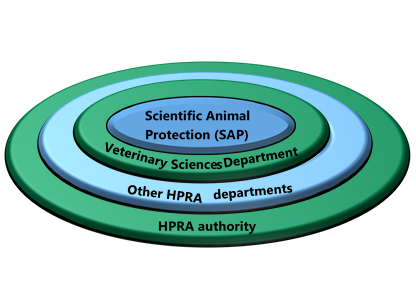Scientific Animal Protection in the HPRA
The Scientific Animal Protection (SAP) section is an operational section that is nested within the HPRA’s Veterinary Sciences Department, and is led by the Director of Veterinary Sciences. The section operates as a separate and distinct section from that dealing with the authorisation and monitoring of veterinary medicines and has its own dedicated personnel. The section assesses applications for individual authorisations, evaluates project applications and inspects premises where animals are bred, supplied or used in procedures. The section is supported in its work by other HPRA departments and the structure is indicated below:

Decisions to authorise breeder/supplier/user establishments, projects and individual authorisations are taken by the HPRA’s Licensing Committee, following the assessment of applications by the relevant technical personnel.
Our Role
We are an independent government agency responsible for specific tasks under national and EU legislation on the protection of animals used for scientific purposes. Please visit the Functions section of our website for further details. We are not a funding body and we are not the competent authority for research into the development of alternative test methods. We report to the Department of Health in relation to the matters covered by Directive 2010/63/EU.
The HPRA may seek the advice of an expert body appointed by government, the National Committee for the Protection of Animals Used for Scientific Purposes on matters dealing with the acquisition, breeding, accommodation, care and use of animals in procedures and the sharing of best practices. However the HPRA and the National Committee are independent bodies in the performance of their separate tasks.
European Network
The HPRA participates in a European network with responsibility for the implementation of Directive 2010/63/EU. This network, which is managed by the EU Commission, is committed to ensuring the welfare and protection of animals used for scientific purposes and promoting the principles of the 3Rs - Replacement, Reduction and Refinement
Transparency
We are committed to providing an effective and efficient regulatory framework that is open and transparent with no bias towards any special interests.
Please see the transparency section of our website for further information and details of our Code of Conduct and Conflicts of Interest policies.